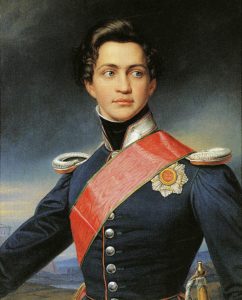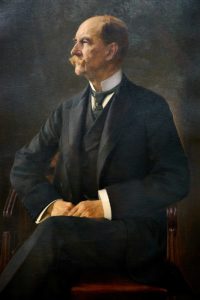
Otto’s reign was despotic, and in its first 11 years of independence Greece was ruled by a Bavarian oligarchy led by Joseph Ludwig von Armansperg as Prime Minister and, later, by Otto himself, who held the title of both King and Premier. Throughout this period Greece remained under the influence of its three protecting Great Powers, France, Russia, and the United Kingdom, as well as Bavaria. In 1843 an uprising forced the king to grant a constitution and a representative assembly.
Despite the absolutism of Otto’s reign, the early years proved instrumental in creating institutions which are still the bedrock of Greek administration and education. Important steps were taken in the creation of the education system, maritime and postal communications, effective civil administration and, most importantly, the legal code. Historical revisionism took the form of de-Byzantinification and de-Ottomanisation, in favour of promoting the country’s Ancient Greek heritage. In this spirit, the national capital was moved from Nafplio, where it had been since 1829, to Athens, which was at the time a village.

Religious reform also took place, and the Church of Greece was established as Greece’s national church, although Otto remained a Catholic. 25 March, the day of Annunciation, was chosen as the anniversary of the Greek War of Independence in order to reinforce the link between Greek identity and Orthodoxy. Pavlos Karolidis called the Bavarian efforts to create a modern state in Greece as “not only appropriate for the peoples’ needs, but also based on excellent administrative principles of the era”.
Otto was deposed in the 23 October 1862 Revolution. Multiple causes led to his deposition and exile, including the Bavarian-dominated government, heavy taxation, and a failed attempt to annex Crete from the Ottoman Empire. The catalyst for the revolt was Otto’s dismissal of Konstantinos Kanaris from the Premiership. A year later, he was replaced by Prince Wilhelm (William) of Denmark, who took the name George I and brought with him the Ionian Islands as a coronation gift from Britain. A new Constitution in 1864 changed Greece’s form of government from constitutional monarchy to the more democratic crowned republic. In 1875 the concept of parliamentary majority as a requirement for the formation of a government was introduced by Charilaos Trikoupis, curbing the power of the monarchy to appoint minority governments of its preference.

Corruption, coupled with Trikoupis’ increased spending to fund infrastructure projects like the Corinth Canal, overtaxed the weak Greek economy and forced the declaration of public insolvency in 1893. Greece also accepted the imposition of an International Financial Control authority to pay off the country’s debtors. Another political issue in 19th-century Greece was uniquely Greek: the language question. The Greek people spoke a form of Greek called Demotic. Many of the educated elite saw this as a peasant dialect and were determined to restore the glories of Ancient Greek.
Government documents and newspapers were consequently published in Katharevousa (purified) Greek, a form which few ordinary Greeks could read. Liberals favored recognizing Demotic as the national language, but conservatives and the Orthodox Church resisted all such efforts, to the extent that, when the New Testament was translated into Demotic in 1901, riots erupted in Athens and the government fell (the Evangeliaka). This issue would continue to plague Greek politics until the 1970s.
